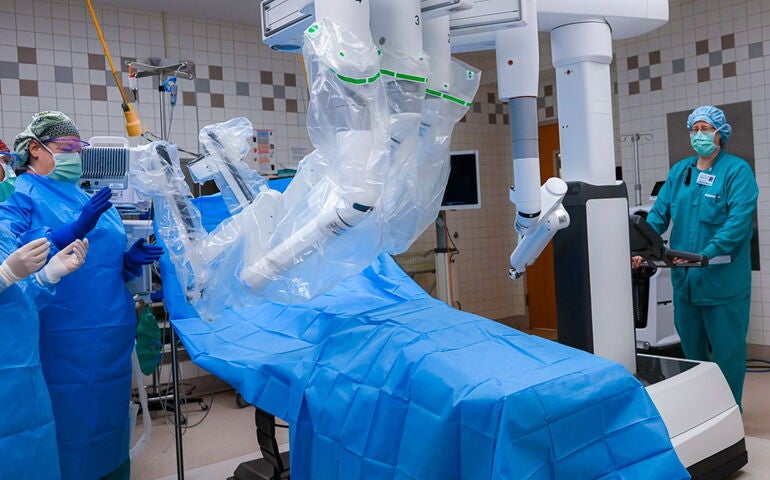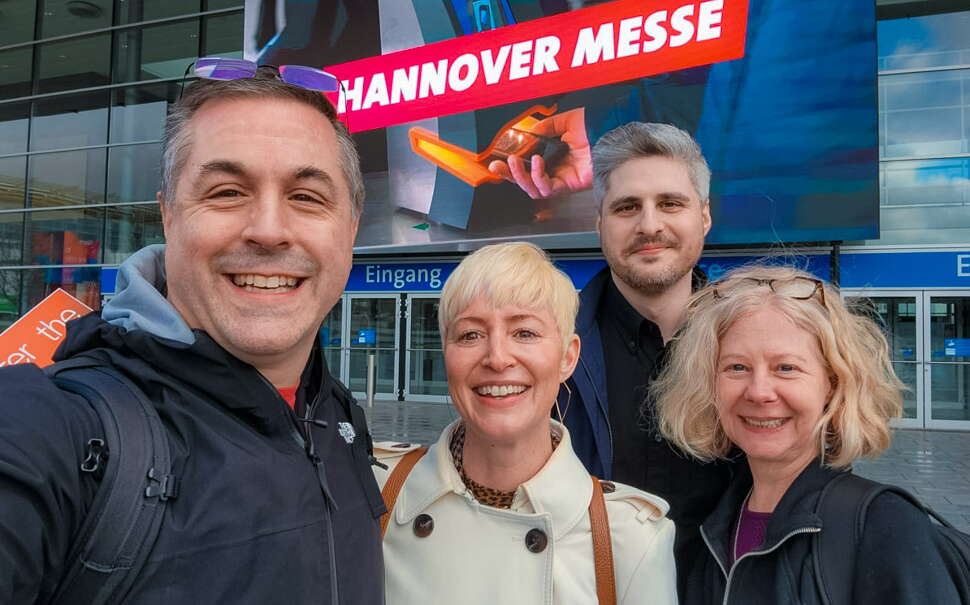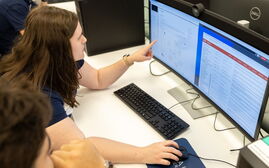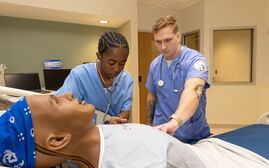
Jobs with growth potential: A roundup of tech jobs in Maine
 Photo / Courtesy of MaineGeneral Health
From left, nurses Alyssa Rainey, Tammy Sylvain and Kristy Knight prep a da Vinci robot for surgery.
Photo / Courtesy of MaineGeneral Health
From left, nurses Alyssa Rainey, Tammy Sylvain and Kristy Knight prep a da Vinci robot for surgery.
Looking for a job in technology can take you into a range of industries in Maine. Here’s an overview of some three entirely different types of tech opportunities.
A surgical robot in need of a handler
MaineGeneral recently announced the upgrade of its robot-assisted da Vinci surgical system at the Thayer Center for Health in Waterville.
The goal is to provide all residents in the Kennebec Valley with minimally invasive surgical options close to home, according to a news release.
In 2009, MaineGeneral acquired its first da Vinci system. In 2019, it installed a robot at Thayer Center for Health in Waterville for outpatient surgeries and upgraded its robot in Augusta.
Da Vinci is a robot system made by the Silicon Valley company Intuitive Surgical Inc. (Nasdaq:ISRG), in Sunnyvale, Calif. The system consists of a control console that can view the surgical field through a miniaturized, highly magnified 3D camera while controlling movement of specialized surgical instruments such as tiny “wristed” scissors, scalpels and forceps. The system translates the surgeon’s hand movements, at the console, to the instruments performing the procedure.
Robot-assisted surgical systems are used to perform a range of elective and emergent general surgery procedures, surgical oncology procedures as well as specialty surgical procedures including bariatrics, thoracic, urologic, vascular and women’s health.
MaineGeneral was able to upgrade to the latest robot thanks to congressionally directed spending funds awarded in 2023 and supported by U.S. Sens. Susan Collins, R-Maine, and Angus King, I-Maine.
“The precision and enhanced visualization offered with the upgrade allows us to perform surgeries with greater accuracy, resulting in less pain and faster recovery for our patients, which ultimately is the goal,” said Karen Bossie with MaineGeneral Obstetrics and Gynecology.
Roxanne Perrault, the administrative director of surgical services, said the new model brings efficiencies and standardization that’s helpful for staff.
“It is ergonomically better, making longer surgeries less tiring,” said Gabriel Belanger of MaineGeneral Urology. “The new robot will benefit day surgery patients here at Thayer, as well as patients at the Alfond Center for Health by opening up more access to surgery.”
MaineGeneral is one of three medical centers in Maine that has an advanced robotics system. Robotic surgery benefits for patients are said to include less blood loss and tissue damage, less pain after surgery, shorter hospital stays and faster recovery time.

A UMaine campus offers simulator training for nursing students
Two nursing faculty members with the University of Maine at Augusta recently attended the International Meeting on Simulation in Healthcare, the world’s largest conference dedicated to health care simulation learning, research and scholarship.
The event, held over four days in Orlando, Fla., brought together health care professionals, educators and innovators from around the world to explore the evolving role of simulation in training the next generation of health care providers.
Shannon Gauvin, the University of Maine at Augusta’s director of nursing, and Erin Voisine, manager of the Learning Resource Laboratory manager and a nursing lecturer, participated in more than a dozen educational sessions. Their attendance was supported by a grant from the Davis Education Foundation. Scott Cook, UMA’s simulation operations manager, also attended.
On the nursing side, they learned how simulation is transforming patient care, clinical decision-making and health care education.
“Simulation training is revolutionizing health care education by allowing students to practice critical procedures in a controlled environment before stepping into real-world clinical settings,” said Gauvin. “For Maine, where many hospitals and clinics serve large rural populations with limited resources, this training ensures our graduates are ready to provide high-quality care from day one.”
By implementing cutting-edge simulation techniques, the university’s goal is to enhance its nursing program. Simulation-based education is said to improve patient outcomes, boost provider confidence and create a more adaptable and resilient health care workforce.
“By investing in simulation training, we’re not just improving education — we’re improving health care for Maine communities,” said Voisine.
Simulation will feature in UMA’s new nursing education facility, under construction at the Capital Center at the Marketplace at Augusta and slated to open in time for the fall 2025 semester.
UMA’s nursing program has grown from 91 students in the 2019-20 school year to 265 in 2024–25.
The new facility will be 50% larger than its current location at the Augusta Civic Center. It will have advanced laboratories and collaborative areas and triple the program’s simulation lab capacity.
The enhancements are expected to help UMA address Maine’s nursing shortage by increasing enrollment capacity to 400 students, offering more robust hands-on learning environments and supporting excellence in nursing and patient care to meet Maine’s health care needs.
An industrial software startup that’s among the region's fastest growing
Out of 154 companies deemed by Inc. magazine to make an outsized impact in the northeastern U.S., Portland-based industrial software startup HighByte is the only Maine entity to make the cut.
Growth is on the menu at HighByte. With a two-year revenue spurt of 925%, HighByte was ranked No. 6 out of 154 companies across nine states.
The company, run by founders Tony Paine, John Harrington and Torey Penrod-Cambra, employs 40 people in total and recently moved to a larger office in Portland with plans to keep growing.
“Since HighByte was founded in 2018, we’ve seen exponential demand for a solution that contextualizes data across the diverse systems within a manufacturing environment,” Penrod-Cambra, the company’s chief communications officer, told Mainebiz in an email from Germany, where the team was attending the Hannover Messe trade fair — one of the world’s largest.
“Especially with the proliferation of new AI tools, manufacturers need a solution that helps them make sense of all the data they have access to in order to gain valuable insights that enable them to be more efficient,” she explained.
HighByte has raised $17.2 million in equity funding to date, including a $12 million Series A round last year.
Asked what’s next for the company, Penrod-Cambra pointed to expanding the workforce as a priority.
“When we moved our office last year,” she said, "we chose a space that would allow us to continue to grow our workforce and offer Portland-local employees a productive and collaborative environment to work in when they choose to.”















0 Comments